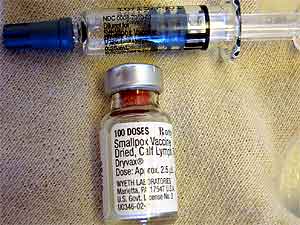|
Audio
Photos
More from MPR
Resources
Your Voice
|
Smallpox vaccinations begin this week
February 10, 2003
 |
| The smallpox vaccine (Image courtesy of Minnesota Health Department) |
St. Paul, Minn. — Holding up an empty box of smallpox vaccine, state epidemiologist Harry Hull launched the state's smallpox vaccination program.
"We are undertaking this vaccination program at the request of the federal government, at the request of CDC, so we will be in a position to respond quickly and effectively, if, heaven forbid, there's ever a smallpox attack against the United States or against Minnesota," Hull said.
Vaccine is now being transported to nine undiclosed locations. Local public health agencies will hold clinics for public health personnel and hospital staff over the next few weeks.
Hull says about 1,700 hospital workers and 1,000 public health workers have volunteered to be vaccinated.
 | |||
"For security reasons, and to protect the privacy of the people who are being vaccinated, we are not disclosing the times or locations of the clinics at this time, and we're not providing any details on how the vaccine is being stored or transported, again, for security reasons," Hull said.
Smallpox vaccine is made with a live virus -- not the smallpox virus, but a close cousin.
The vaccine is given with a needle with two tiny prongs. The needle is dipped into the vaccine, so that a small amount is trapped between the prongs. Then, the needle is used to prick the skin quickly 15 times. Recipients are given a patch to cover the site of the vaccination to prevent spread of the virus contained in the vaccine.
National statistics estimate about one out of one million people could die from the vaccine, while 15 people will become very seriously ill.
Hull stressed the vaccination is voluntary because of the risks involved.
|
We are undertaking this vaccination program at the request of the federal government ... so we will be in a position to respond quickly and effectively, if, heaven forbid, there's ever a smallpox attack against the United States or against Minnesota.
- State epidemiologist Harry Hull |
Jeff Spartz is with the Hennepin County Medical Center and represents the Minnesota Hospital Association. He says 42 out of 139 association hospitals are participating in this vaccination cycle, while 24 hospitals have opted out.
Spartz says one doctor explained why he wouldn't be getting the vaccine.
"He said he was concerned about patients who already have weak immune systems picking up the virus, which does not cause smallpox, but which can cause unfortunate side effects. And on top of their other problems, he thought that was a risk that should not be taken," said Spartz.
Health officials say each of the 2,700 getting this first round of vaccine will be carefully screened to make sure they don't have compromised immune systems.
People who should not get the vaccine include pregnant women or women who plan to become pregnant, people who may be allergic to the vaccine, and people with eczema or other skin conditions.
Also, anyone receiving medical treatments for cancer or transplants should not get the vaccine. People with HIV-AIDS are also at high risk for a negative reaction.
Tracy Sides is the HIV-AIDS surveillance coordinator with the Minnesota Department of Health. She says in 2001 there were just over 4,300 people infected with HIV-AIDS in the state. Though Minnesota is considered a low-incidence state, Sides estimates that at least 30 percent of all the people with HIV don't know it because they've never been tested.
Even though the smallpox vaccination program is far from being available to the general public, Sides says it will be important for the Health Department to reach out to immigrant communities and high risk populations.
"People who are at higher risk for HIV we would love to see get tested, regardless of the onset of this vaccination program. Because of this vaccination program, it's just one more reason people at high risk for HIV really should go and get an HIV test.
Epidemiologist Hull says this is the first phase of the program. He says later phases are still being developed by the CDC. He says states have not received any guidance on preparing a phase two plan.
The Minnesota Department of Health will post the number of people vaccinated and any adverse reactions.
|
News Headlines
|
Related Subjects
|
